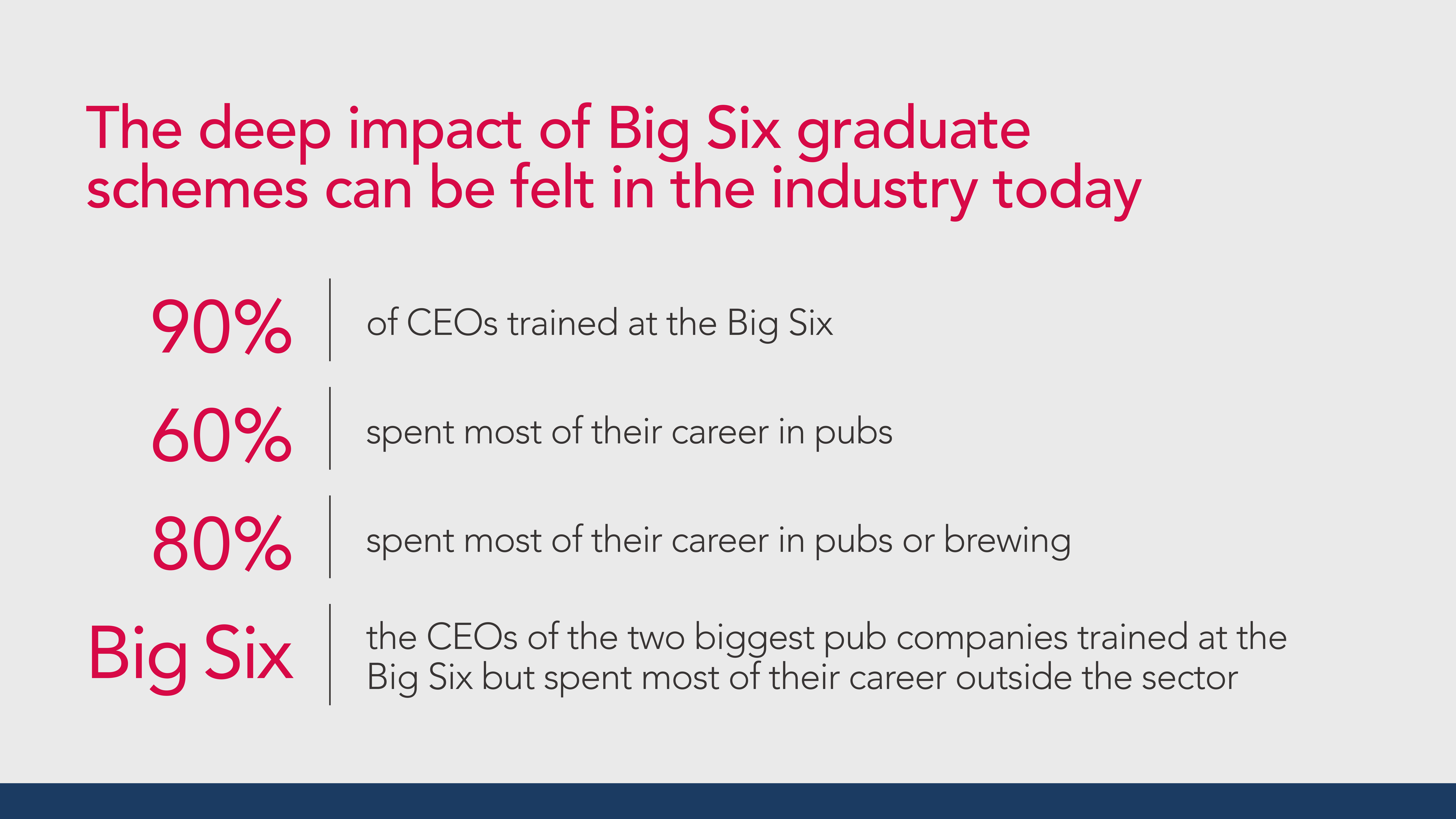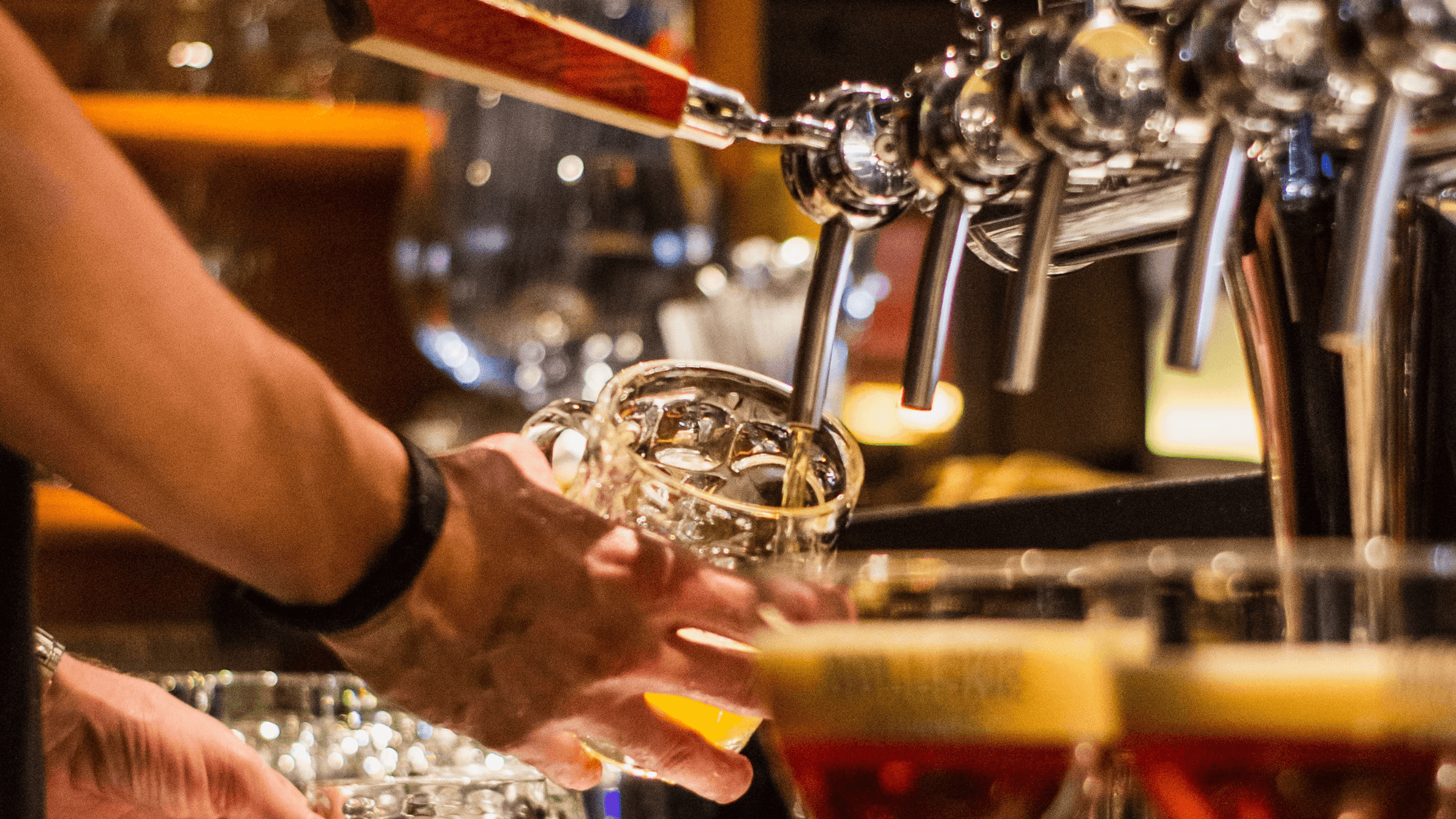Pubs are a unique part of the fabric of UK society. With nearly 50,000 licensed establishments across the length and breadth of the country, even the smallest of villages has one or more pub. The sector employs nearly half a million people – and, in many ways, sits at the heart of community cohesion, work-place social life, and leisure time for much of British society.
For many decades, there has been a strong and visible pool of “oven-ready” CEO talent ready to take over leadership of businesses across this sector. However, that pipeline of CEO talent is running dry – and from my recent conversations with pub CEOs, chairs and investors, it’s clear that there is a growing concern about the thinning pipeline of leaders who are able to step up into the top jobs when the current cohort of CEOs leave.
How did we get here? Our latest white paper explores this.
The root cause of the issue can be traced back to the breakdown of the ‘Big Six’. From the sixties until around the early nineties, six major brewing companies (Allied Breweries, Bass, Mitchells & Butlers, Courage, Grand Metropolitan, Scottish & Newcastle, and Whitbread) dominated the sector – not only brewing the beer, but also owning most of the pubs in the UK. Towards the end of the 1980s, this structure was deemed damaging for competition and the breweries were broken up.
This restructure marked not only the end of a fully integrated pubs sector, but also the end of the majority of the prestigious generalist graduate schemes run by the breweries. These programmes were integral to the industry, producing hundreds of high-calibre leaders in each cohort, each with a deep and rounded understanding of the pub sector, gained from years of hands-on work in a variety of different functions, from property and operations to finance and marketing. Crucially, these grad programmes were very well regarded, widely thought of as being as prestigious as schemes at the likes of British Airways, Unilever or M&S – attracting some of the brightest and best young talent of their generation.

“The grad schemes were real machines,” recalled Nick Mackenzie, CEO at Greene King, when we discussed this. “I arrived at Bass as a property graduate, but there were many streams which made it easy for people to move around. The conglomerates provided so many different opportunities: you could do hotels, manufacturing, tenanted pubs, managed pubs.”
For many decades the ‘Big Six grad programmes have fed the pipeline of pub CEOs. Indeed, nine out of ten of our current biggest industry chief executives trained at one of these ‘schools’ at one point in their career.
However, the pipeline of leadership churned out by these grad schemes is reaching its natural conclusion. Today, the last cohort of leaders who trained in the Big Six are in their mid-fifties, and will be thinking about retiring or moving into non-executive positions in the next few years. After the Big Six was broken down, with a few smaller-scale exceptions, no grad programmes emerged as alternative successors. In large part due to this, the sector lacks a clear ‘bench’ of leaders trained and equipped to step up as successors.
“After the Big Six was broken down, with a few smaller-scale exceptions, no grad programmes emerged as alternative successors”.
Conversations with CEOs also made clear that emerging pub leaders today, now one or two levels below board, are possibly too narrow in their experiences. Having not had the benefit of rotational graduate schemes, they may lack the broad leadership base and set of functional experiences required for a full CEO role.
The sector therefore needs to think creatively, and differently, about where its future leadership will come from. This is not necessarily a wholly bad thing. After all, the industry, and customer, has evolved considerably since graduate schemes had their heyday, and in 2023, a new set of leadership qualities is required.
Leadership within pubs today stretches far beyond operations and finance. It means thinking carefully about customer insight, harnessing technology, and doing right by your people. Kevin Georgel, CEO at St Austell Brewery spoke to this point when we caught up recently. “Thinking back, conversation around the Board table used to be about financial engineering, restructuring, deal-making and property,” he recalled, “but the focus now is people, culture, and creativity.”

In this way, pub leadership is becoming more closely aligned with hospitality leadership more broadly, creating prime conditions for leaders to move from casual dining, QSR, cafes and even retail into pubs. Appointing leaders from adjacent consumer industries can bring a new approach to problem solving in the pub sector, and a greater understanding of areas like digital, data, and customer insight – topics which will be critical to success, but competencies that pubs have historically been slow to embrace.
Nick Collins, CEO of café, bar, and restaurants group Loungers, suggested that smaller, purpose-led hospitality and leisure businesses can be excellent training grounds for innovative future pub leaders. “Often excitement and newness in hospitality comes from smaller businesses,” he told me. “They tend to have the best entrepreneurship, and are often closest to the customer. We’ve found some excellent next-generational talent in these sorts of organisations.”
When bringing in external talent, however, previous multi-site operational experience is crucial. “Pub leaders need to understand how to manage, motivate and inspire hundreds of people across the country, each in a slightly different way,” offered Chris Jowsey, CEO at Admiral Taverns. “If you’ve got general management and retailing skills, then you should prosper in a large managed pubs company.”
“Pub leaders need to understand how to manage, motivate and inspire hundreds of people across the country, each in a slightly different way.” – Chris Jowsey, CEO, Admiral Taverns.
Another strategy for building a solid talent pipeline is identifying candidates who have left the pub sector and bringing them back. Doing so allows companies to benefit from deep industry experience, while also bringing outside insight. In fact, the CEOs of the two biggest pub companies (David McDowall at Stonegate and Nick Mackenzie at Greene King) are leaders who previously left the sector before returning to take up chief executive positions.
“I started out in pubs, but went on to do a raft of different things after that,” reflected David McDowall when we caught up. “As a result, I can bring a slightly different retailer’s mindset to the sector. I can look at the standout best bits of retail, and think about how we bring that to pubs – whether it be across pricing, guest experience, digital innovation or data analysis.”
There’s also an opportunity to better prepare leaders one, two, or three levels below the CEO to create stronger internal talent pipelines. Additionally, where there is a high-potential CEO candidate – who is not yet 100% ready to take on the top standalone role – more pub companies should consider a hybrid structure, appointing a seasoned and experienced pub executive chair, who works alongside a newly-appointed CEO without deep sector experience, before giving them greater freedom and responsibility over time.

Hiring from outside the pub sector for CEOs is not without risk. For all the similarities of the pub sector with retail, leisure and broader hospitality, pubs have a very specific set of operational and commercial nuances. After all, serving 6 billion (!) pints of beer a year – to say nothing of other food and beverage offerings – is a no mean feat.
Therefore, over and above a traditional CEO selection progress, I would suggest that pubs apply a special lens to external leaders they are looking to bring in. Pub CEOs should have:
1. A passion for pubs. Candidates need to have a real personal passion for the pub sector, spending parts of their own leisure time immersed in pub culture. You simply can’t lead a pub business without loving the product!
2. Resilience. Running pubs, particularly in today’s operational and inflationary environment, is simply tough – and leaders need to me able to manage the myriad of challenging operational challenges that pubs present.
3. Agility. The pub world has changed beyond recognition over the last decade, and CEOs need to be able to adapt and flex their style to ensure their businesses remain current and relevant for their customers.
4. Customer centricity. The most successful operators will know their customers, and successfully tweak their propositions, to cater to different local communities
5. People centricity. The largest pub companies employ up to 50,000 people each. These are huge teams – amongst the largest in hospitality – who need to be constantly led, inspired and motivated to deliver exceptional customer experiences.
6. Breadth. A successful pub CEO will move seamlessly between working with sophisticated investors, to lobbying on behalf of the sector, to refinancing debt, to hiring a new MD, to signing off on a new brand format. The more functional breadth a CEO has before joining the sector, the better.
7. Creativity and innovation. Pub CEOs have to rethink the pub model and build a business which speaks to a new generation of customers with different needs and aspirations.
8. Competitive spirit. A great CEO will empower their leaders to compete both nationally and locally, giving teams the toolkits they need to succeed.
9. Authenticity. Employees now look for authentic leadership – and want to know the “real” person behind the CEO façade.
10. A commitment to diversity. Pub leadership is still overwhelmingly white, straight, and male. Creating leadership teams which represent a fuller spectrum of the pub customer base – or potential customer base – is not only a moral choice, but makes clear commercial sense
You can read our full white paper here. I hope this resource can be used as a tool to inform succession planning within our thriving pub sector in the UK – before the pipeline of future talent does “run dry”. I’d be very keen for your feedback – and to hear if these themes are playing out in your own organisation.








